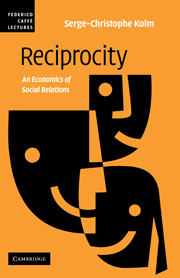3 - Giving and exchanges
Published online by Cambridge University Press: 22 September 2009
Summary
Concepts and distinctions
Person, agent, actor, individual, etc.
We consider entities with these names who can act, perform actions, engage in conduct resulting in behaviour, be responsible, have feelings, emotions, sentiments, reasons and motives of all kinds, have information, expectations and memory, have attitudes, preferences and desires, have social status, and so on. They will usually be individuals, but they can occasionally be constituted groups or institutional entities (whose consideration as persons in these various respects requires an extended discussion omitted here).
Action, conduct, behaviour, motives, preference
An action is a set of acts (possibly a single act) with an intention (or joint intentions) and a meaning for its actor (and generally also for other members of the society). An action manifests some freedom (although it can be more or less constrained and induced). Hence, it implies some responsibility of the agent. The intention results from motives, which can be reasons or sentiments of various possible types. A set of acts is behaviour. A set of actions is conduct. Hence, conduct is behaviour plus the corresponding motives (and meaning). Desires and drives are types of motives. Preference evaluates several alternatives comparatively with respect to some values. Applied to action, it describes the choice of one of the possible alternatives (economists' “revealed preferences”), as a result of the corresponding motives.
Gift giving
We consider actions that are intended to benefit someone else and are in some way costly for the actor.
- Type
- Chapter
- Information
- ReciprocityAn Economics of Social Relations, pp. 50 - 73Publisher: Cambridge University PressPrint publication year: 2008

